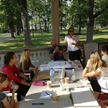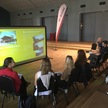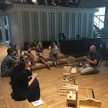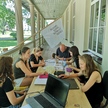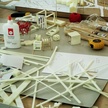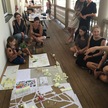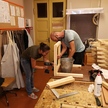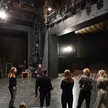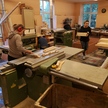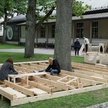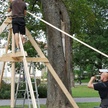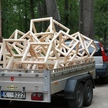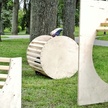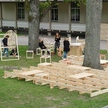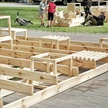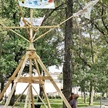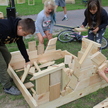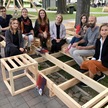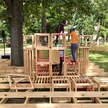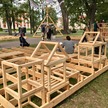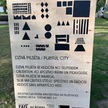RISEBA summer school of architecture and urban design – "FestivaL'and 2.0."
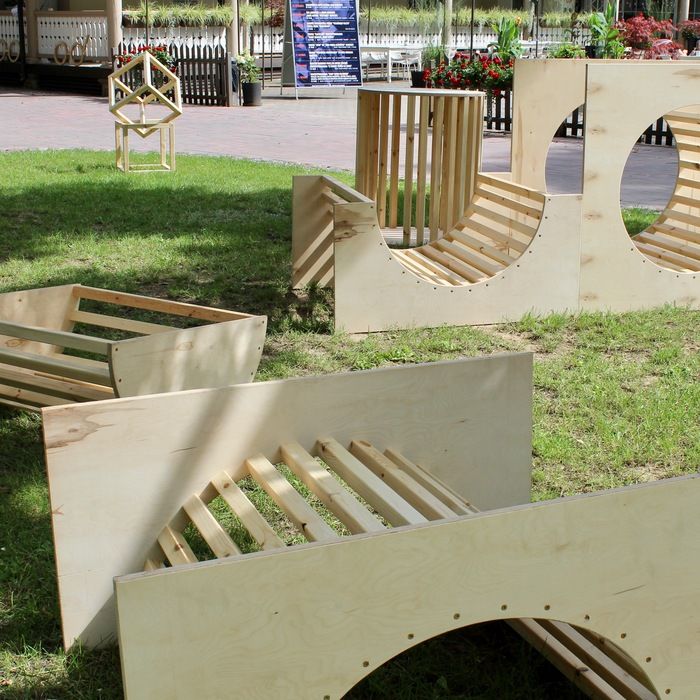
Students of architecture, urban design, and related disciplines were invited to RISEBA Summer School on the Ephemeral Architecture and Urban Design “FestivaL’and 2.0” also in 2019. The summer school was organized as a cooperation between RISEBA Faculty of Architecture and Design and Valmiera Summer Theatre festival (VVTF) from July 25 to Aug 2 in Valmiera city, Latvia.
The VVTF has so far three years of experience in discovering the city spaces for theatre performance. By joining the forces with RISEBA University of Applied Sciences the plans to generate more ambitious ideas and construct the festival village in the center of Valmiera has resulted in the cooperation to organize the summer school already for a second year. The summer school is devoted to the idea of the contemporary ephemeral architecture and urban design elements as catalysts for important shifts in the urban environment.
The participants of the course gained new skills, had guidance and practical training in constructing their design ideas in scale 1:1. In addition to the knowledge and practical skills provided, the aim of the course was also to enhance the awareness of the impact the certain design solutions leaves on the urban setting increasing the sensibility of the social, cultural aspects in creating an inclusive city for all generations. Considering the local specifics of Latvia, timber, and wood production products are chosen as the main construction materials. Students learned how to deal with the given program and actual site, how to co-operate within the teams, how to manage the design development process from sketch to construction site while constantly being able to experiment and challenge themselves.
Concept of 2019 – Playful and living city. Social diversity and inclusivity are fundamental aspects of any thriving city. Architecture and urban design play key roles in nurturing these characteristics. Majority of urban spaces, however, are built on somewhat pragmatic principles and outdated understanding of social structures and therefore often fail to efficiently address the needs of today’s cities and their inhabitants.
Playful city sets out to seek new directions for shaping future social spaces, focusing on children within the city and ways in which different age groups could mutually benefit from the interaction. A traditional urban space would consist of one part that is dedicated to adults and a fenced-off area with a swing and a slide for children – a playground. The playful city would be a different environment that encourages any person to engage in playful behavior. The traditional model gives clear signals that, for example, a 'grown-up' should sit there, and a kid should slide there. In contrast, the Playful city allows anyone to freely find their own meanings and uses for the setting, and take an active part in forming the social space of the city.
Anyone taking a closer look at the behavior of children would soon come to the conclusion that it is not the brightly colored standardized equipment of a playground that the kids crave. It is first and foremost the freedom to act, to be in an environment that they are allowed to engage independently and have permission to explore on their own terms. Any space that occasionally can fit this description (for example a garden, a large atrium, an exhibition space or an abandoned industrial area) will spark the playful behavior. Can we, as architects and designers, create an environment that respects children in the same way as any other member of the society, without creating fixed action patterns? Can we create an environment that encourages playfulness in adults and allow new, more varied and efficient use of public space?
In the occasion of Valmiera Summer Theatre festival, which is dedicated to children and families in 2019, the participants of the summer school were invited to imagine and build festival’s center – a public space for all ages that stimulates interaction and creativity. A testing ground for the ideas of Playful city.
The summer school was led by the international and local team of designers and invited professionals: architect Kārlis Melzobs (LV), set designer and carpenter Rudolf Bekic (LV/AT), theatre director and set designer Reinis Suhanovs (LV), architect Dina Suhanova (LV). Participants of the summer school received 3 ECTS and a certificate confirming the participation. More about the summer school HERE.
